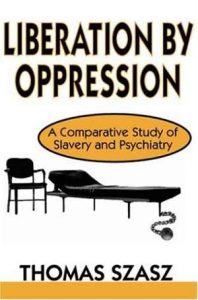نام کتاب: Liberation By Oppression – A Comparative Study Of Slavery And Psychiatry
نویسنده: Thomas Stephen Szasz
ویرایش: ۱
سال انتشار: ۲۰۰۲
کد ISBN کتاب: ۰۷۶۵۸۰۱۴۵۰, ۹۷۸۰۷۶۵۸۰۱۴۵۶,
فرمت: PDF
تعداد صفحه: ۲۴۳
حجم کتاب: ۸ مگابایت
کیفیت کتاب: اسکن
انتشارات: Transaction انتشاراتs
Description About Book Liberation By Oppression – A Comparative Study Of Slavery And Psychiatry From Amazon
Originally called mad-doctoring, psychiatry began in the seventeenth century with the establishing of madhouses and the legal empowering of doctors to incarcerate persons denominated as insane. Until the end of the nineteenth century, every relationship between psychiatrist and patient was based on domination and coercion, as between master and slave. Psychiatry, its emblem the state mental hospital, was a part of the public sphere, the sphere of coercion.
The advent of private psychotherapy, at the end of the nineteenth century, split psychiatry in two: some patients continued to be the involuntary inmates of state hospitals; others became the voluntary patients of privately practicing psychotherapists. Psychotherapy was officially defined as a type of medical treatment, but actually was a secular-medical version of the cure of souls. Relationships between therapist and patient, Thomas Szasz argues, was based on cooperation and contract, as is relationships between employer and employee, or, between clergyman and parishioner. Psychotherapy, its emblem the therapist’s office, was a part of the private sphere, the contract.
Through most of the twentieth century, psychiatry was a house divided-half-slave, and half-free. During the past few decades, psychiatry became united again: all relations between psychiatrists and patients, regardless of the nature of the interaction between them, are now based on actual or potential coercion. This situation is the result of two major “reforms” that deprive therapist and patient alike of the freedom to contract with one another: Therapists now have a double duty: they must protect all mental patients-involuntary and voluntary, hospitalized or outpatient, incompetent or competent-from themselves. They must also protect the public from all patients.
Persons designated as mental patients may be exempted from responsibility for the deleterious consequences of their own behavior if it is attributed to mental illness. The radical differences between the coercive character of mental hospital practices in the public sphere, and the consensual character of psychotherapeutic practices in the private sphere, are thus destroyed. At the same time, as the scope of psychiatric coercion expands from the mental hospital to the psychiatrist’s office, its reach extends into every part of society, from early childhood to old age.
درباره کتاب Liberation By Oppression – A Comparative Study Of Slavery And Psychiatry ترجمه شده از گوگل
روانپزشکی که در ابتدا دکترهای جنون آمیز نامیده می شد ، از قرن هفدهم با تأسیس مجنون ها و توانمند سازی قانونی پزشکان برای زندانی کردن افراد مجنون آغاز شد. تا اواخر قرن نوزدهم ، هر رابطه ای بین روانپزشک و بیمار مبتنی بر سلطه و اجبار ، مانند بین ارباب و برده بود. روانپزشکی ، نماد آن بیمارستان روانی دولتی ، بخشی از حوزه عمومی ، حوزه اجبار بود.
ظهور روان درمانی خصوصی ، در پایان قرن نوزدهم ، روانپزشکی را به دو قسمت تقسیم کرد: برخی از بیماران همچنان زندانی غیر ارادی بیمارستان های دولتی بودند. دیگران به بیماران داوطلب روانپزشکانی که بصورت خصوصی تمرین می کنند تبدیل شدند. روان درمانی به طور رسمی به عنوان نوعی درمان پزشکی تعریف می شد ، اما در واقع نسخه ای سکولار-پزشکی از درمان روح بود. روابط بین درمانگر و بیمار ، به گفته توماس ساساز ، براساس روابط و قرارداد ، و همچنین روابط بین کارفرما و کارمند ، یا بین روحانی و کلیسا است. روان درمانی ، نماد آن دفتر درمانگر ، بخشی از حوزه خصوصی بود ، قرارداد.
در بیشتر قرن بیستم ، روانپزشکی خانه ای بود که به دو نیمه برده و نیمه رایگان تقسیم می شد. طی چند دهه گذشته ، روانپزشکی دوباره متحد شد: کلیه روابط روانپزشکان و بیماران ، صرف نظر از ماهیت تعامل بین آنها ، اکنون بر اساس اجبار واقعی یا بالقوه است. این وضعیت نتیجه دو “اصلاح” بزرگ است که درمانگر و بیمار را به طور یکسان از آزادی قرارداد با یکدیگر محروم می کند: اکنون درمانگران وظیفه مضاعفی دارند: آنها باید از همه بیماران روانی – غیر ارادی و داوطلبانه ، بستری در بیمارستان یا سرپایی ، بی لیاقت یا صالح – از خودشان. آنها همچنین باید از مردم در برابر همه بیماران محافظت کنند.
افرادی که به عنوان بیمار روانی تعیین می شوند ، در صورت انتساب به بیماری روانی ، ممکن است از مسئولیت عواقب سو dele رفتار خود معاف شوند. اختلافات اساسی بین شخصیت قهری اعمال بیمارستانی روانی در حوزه عمومی و شخصیت توافقی اعمال روان درمانی در حوزه خصوصی از بین می رود. در همان زمان ، با گسترش دامنه اجبار روانپزشکی از بیمارستان روانی تا مطب روانپزشکی ، دامنه آن از همه اوایل کودکی تا پیری در همه بخش های جامعه گسترش می یابد.
[box type=”info”]![]() جهت دسترسی به توضیحات این کتاب در Amazon اینجا کلیک کنید.
جهت دسترسی به توضیحات این کتاب در Amazon اینجا کلیک کنید.![]() در صورت خراب بودن لینک کتاب، در قسمت نظرات همین مطلب گزارش دهید.
در صورت خراب بودن لینک کتاب، در قسمت نظرات همین مطلب گزارش دهید.

